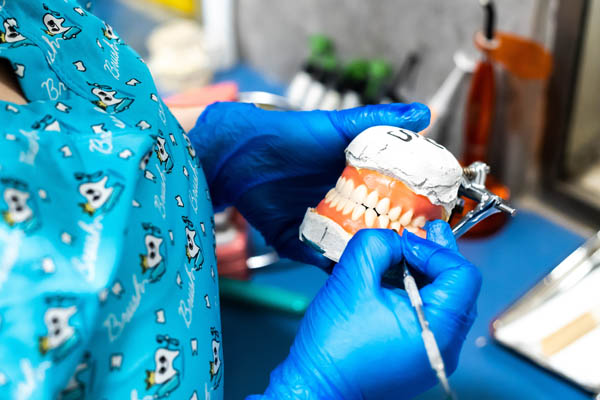Can a Dentist Rebuild a Damaged Tooth With a Dental Restoration?

Dental restoration procedures can be used to repair damaged teeth and restore their function. Many of these treatments also address aesthetic issues affecting the tooth. Teeth are one of the strongest parts of the body, but they also deal with many things that can damage them, like acids, bacteria and bite forces. Teeth can also be damaged by trauma to the face from an accident or sports.
Dental restoration for damaged teeth
Thanks to innovations in dentistry, there is a way to fix most types of damage that affect teeth. If a tooth is too damaged to be fixed, the dentist might extract it and replace it with a prosthetic like a dental implant.
Getting dental restoration procedures starts with a dentist evaluating the condition of your teeth. A treatment plan is then crafted to address the damage to the patient's teeth. Treatments that might be part of a patient's plan include the following.
Treatments
Composite bonding: This is one of the more affordable and least invasive procedures used to restore teeth. It does not involve making any alterations to teeth; instead, teeth are only roughened with an etching solution so the composite sticks better to them. The composite comprises glass and plastic and is color-matched with the rest of the patient's teeth. The material is applied directly to a damaged tooth and shaped as desired. A curing light is used to harden the composite, then the tooth is polished.
Crowns: These restorations can be used to fix a bunch of issues like cracked, deformed, broken and chipped teeth. The cap goes over the visible part of the tooth and looks just like a real tooth. It protects the damaged tooth from being further damaged by acids in the mouth or bite forces and restores the tooth's function.
Root canal: Root canals are performed when the damage to a tooth reaches its inner chambers. The procedure involves drilling a hole into a damaged tooth and using files to remove its nerve and blood vessels. Medication may be applied to the area before the tooth is sealed with a rubbery filling material. The tooth might then be covered with a crown to protect its weakened structure. Root canals are also performed when a tooth has been infected.
Extractions: At times, the damage to a tooth is too severe to save the tooth. When this occurs, an extraction might be recommended. This involves the dentist surgically removing the tooth from its sockets. Dentists are not big fans of patients having missing teeth because that leads to jawbone atrophy. Oral prosthetics like implants might be recommended after teeth are pulled out.
Restore your damaged teeth
Our dentist has a great deal of experience repairing and rebuilding damaged teeth. Give us a call or visit our Columbia clinic, and our dentist will educate you about your options.
Request an appointment here: https://columbiadentaloffice.com or call Columbia Advanced Dental Studio at (410) 635-5105 for an appointment in our Columbia office.
Check out what others are saying about our dental services on Yelp: Dental Restorations in Columbia, MD.
Related Posts
Traditionally, dental restorations require an individual to have a physical impression of their mouth taken. Impressions are necessary to accurately create an indirect dental restoration, which are restoration made outside of the oral cavity and applied at a later time. Dental crowns, veneers, inlays and onlays are all examples of restorations that require impressions in order to…
Dental onlays and inlays are necessary to remedy damaged rear teeth that are not in bad enough shape to need a crown. These oral health restorations are primarily used to correct fractured, cracked or decayed teeth when the damage is mild or moderate. In certain instances, inlays or onlays can function in place of a…
Everyone would love to have a set of white, healthy teeth, but it takes more than brushing and flossing to properly take care of them. It is equally important that you abstain from things that are not good for your overall oral health and the condition of your teeth.Sugar is bad for your oral and…
After cracking a tooth, you are likely wondering what the cause is and how you can treat it. Stay calm, collect yourself, pick up the phone and call the dentist. An oral health professional will analyze the cracked tooth to determine if it is indeed cracked and what repair options are available.There are different types…
